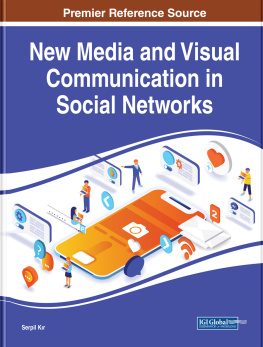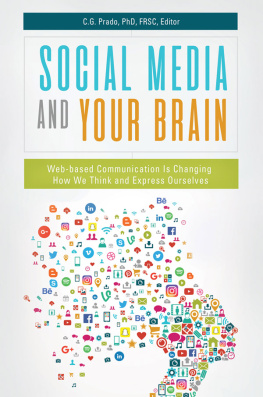AN ECOLOGY OF COMMUNICATION
COMMUNICATION AND SOCIAL ORDER
An Aldine de Gruyter Series of Texts and Monographs
Series Editor
David R. Maines, Wayne State University
Advisory Editors
Bruce Gronbeck Peter K. Manning William K. Rawlins
David L. Altheide, An Ecology of Communication: Cultural Formats of Control
David L. Altheide and Robert Snow/Media Worlds in the Postjournalism Era
Joseph Bensman and Robert Lilienfeld, Craft and Consciousness: Occupational Technique and the Development of World Images(Second Edition)
Jrg R. Bergmann, Discreet Indiscretions
Herbert Blumer, Industrialization as an Agent of Social Change: A Critical Analysis(Edited with an Introduction by David R. Maines and Thomas J. Morrione)
Dennis Brissett and Charles Edgley (editors),Life as Theater: A Dramaturgical Sourcebook(Second Edition)
Richard Harvey Brown (editor),Writing the Social Text: Poetics and Politics in Social Science Discourse
Norman K. Denzin, Hollywood Shot by Shot: Alcoholism in American Cinema
Irwin Deutscher, Fred P. Pestello, and H. Frances G. Pestello, Sentiments and Acts
Pasquale Gagliardi (editor),Symbols and Artifacts: Views of the Corporate Landscape (paperback)
Bryan S. Green, Gerontology and the Construction of Old Age: A Study in Discourse Analysis
Jaber F. Gubrium, Speaking of Life: Horizons of Meaning for Nursing Home Residents
J. T. Hansen, A. Susan Owen, and Michael Patrick Madden, Parallels: The Soldiers Knowledge and the Oral History of Contemporary Warfare
Emmanuel Lazega, The Micropolitics of Knowledge: Communication and Indirect Control in Workgroups
Niklas Luhmann, Risk: A Sociological Theory
David R. Maines (editor),Social Organization and Social Process: Essays in Honor of Anselm Strauss
Peter K. Manning, Organizational Communication
Stjepan G. Mestrovic, Durkheim and Postmodernist Culture
R. S. Perinbanayagam, Discursive Acts
William K. Rawlins, Friendship Matters: Communication, Dialectics, and the Life Course
Dmitry Shlapentokh and Vladimir Shlapentokh, Soviet Cinematography, 1918-1991: Ideological Conflict and Social Reality
Anselm Strauss, Continual Permutations of Action
Jacqueline P. Wiseman, The Other Half: Wives of Alcoholics and Their Social-Psychological Situation
AN ECOLOGY OF COMMUNICATION
Cultural Formats of Control
DAVID L. ALTHEIDE
About the Author
David L. Altheide is Regents Professor, School of Justice Studies, Arizona State University. A recipient of both the Premio Diego Fabbri and Charles Horton Cooley awards, Dr. Altheide was President of the Society for the Study of Symbolic Interaction in 199596.
Dr. Altheide is a frequent contributor to major journals, and is author of Media Power; Creating Reality: How TV News Distorts Events; and coauthor of Media Logic; Bureaucracy and Freedom; Bureaucratic Propaganda; and (with Robert P. Snow) Media Worlds in the Postjournalism Era (Aldine).
First published 1995 by Aldine De Gruyter
Published 2019 by Routledge
2 Park Square, Milton Park, Abingdon, Oxon OX14 4RN
52 Vanderbilt Avenue, New York, NY 10017
Routledge is an imprint of the Taylor & Francis Group, an informa business
Copyright 1995 Taylor & Francis.
All rights reserved. No part of this book may be reprinted or reproduced or utilised in any form or by any electronic, mechanical, or other means, now known or hereafter invented, including photocopying and recording, or in any information storage or retrieval system, without permission in writing from the publishers.
Notice:
Product or corporate names may be trademarks or registered trademarks, and are used only for identification and explanation without intent to infringe.
Library of Congress Cataloging-in-Publication Data
Altheide, David L.
An ecology of communication : cultural formats of control / David L. Altheide.
p.cm. (Communication and social order)
Includes bibliographical references (p.) and index.
ISBN 0-202-30532-5. ISBN 0-202-30533-3 (pbk.)
1. Communication and culture. I. Title.II. Series.
P94.6.A451995
ISBN 13: 978-0-202-30533-2 (pbk)
For Carla, again and again
Contents
This book is about social power and social control, how they are maintained, recognized, and challenged. The main interest is in some rituals, routines, and perspectives that have become commonplace in public and organizational life. There are some basic assumptions for this task. One is that social power is about controlling and enforcing the definition of a situation. Another is that those resources and particular elements that are used in defining and enforcing the definition of a situation are part of a symbolic and communicative process. Yet another major element is that the technologies and language (or discourse) of information technology and the mass media overwhelmingly are key elements of the process in our modern (and postmodern world). In short, social order is increasingly an electronically communicated and mediated order, and this has tremendous consequences for social life and especially for freedom and justice.
My focus is on the ecology of communication, or the structure, organization, and accessibility of various forums, media and channels of information. The challenge is to offer a perspective that joins information technology (IT) and communication (media) formats with the activities. The context of communication is addressed because the broader issue concerns social power. Social power resides less in individuals than it does in processes and communicative logics that inform how situations are defined, the sources of such definitions, and their consequences. Increasingly, such processes are involved with records and procedures. It is records-as-life-and-event-documentation that haunt us more than particular individuals; it is processes and procedures-as-bureaucratic-rules-that-are-feared-and-reified that guide, yet limit, individual activity. It is, in brief, the matrix of information technology, formats, and activities that connects our past, present and futures in dot-to-dot-like patterns that are so taken for granted and even believed in that their range of implications has gone largely undetected. Indeed, for individuals to be authorized as an appropriate person for a position/job they must increasingly demonstrate their competence and skill in working with and through the formats and logics of information technology.
In our age, identity, biography, credibility, authority, and promise are all touched by information technology and formats of communication. Information technology has affected each of the following, and often disturbed previous distinctions and relations between each: working, eating, sleeping, loving, remembering, accounting, playing, fighting, learning, studying, and, of course, writing.






